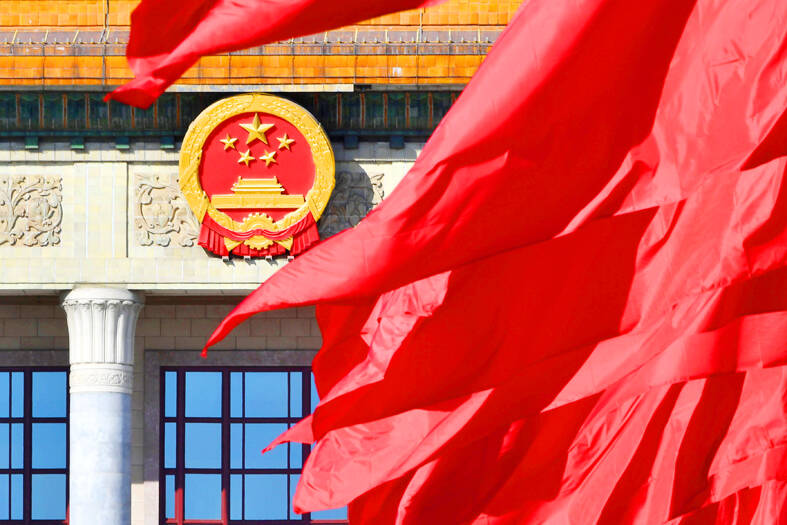Price-cutting competition would reduce the quality of travel in China, a Taiwanese researcher said on Thursday after China’s Fujian Provincial Government rolled out incentives to attract Taiwanese tourists.
Cash bonuses of 80,000 yuan (US$11,250), 50,000 yuan and 30,000 yuan would be given annually to the top three travel industry operators who attract the most Taiwanese to travel to Fujian Province’s Nanping City, the provincial government said on Tuesday.
Taiwanese would rather travel to other countries instead of China, where they would put themselves in danger, Taiwan Thinktank researcher Wu Se-chih (吳瑟致) said, adding that the bonuses reflect the fact that traveling to Fujian does not appeal to Taiwanese.

Photo: Reuters
The Fujian Provincial Government expects to attract more Taiwanese through the travel industry, but the businesses are likely to compete for the bonuses via a price war, which would certainly lead to a decline in quality, Wu said.
The number of Taiwanese visiting China has plummeted, as the government had upgraded its travel warning and banned group tours to the country following Beijing’s announcement of its 22 guidelines “to punish Taiwanese independence diehards,” he said.
The Fujian Provincial Government is trying to boost the number in a move to step up cross-strait integration and exchanges, but such “united front” tactics might not work if the number of Taiwanese visiting the region continues to decline, he added.
The effort has four aspects: promote financial cooperation with Taiwan, encourage Taiwanese to work in Fujian, expand judicial services for Taiwanese arbitration institutions, and facilitate life and travel in Fujian for Taiwanese, Wu said.
For example, Taiwanese travelers could make mobile payments via digital cards provided by Industrial Bank through China UnionPay, while 60 banking and insurance institutions dedicated to providing financial services for Taiwanese people and companies would be set up.
To facilitate international financing for Taiwanese enterprises, qualified companies operating in Fujian could borrow from external sources at banks instead of at foreign exchange bureaus.
Taiwanese medical department students whose educational background has been certified by the Chinese Service Center for Scholarly Exchange could sign up for China’s National Medical Licensing Examination in Fujian after they have worked in a qualified hospital in the province for a year and passed assessments.
In Zhangzhou City, 240 job vacancies would be provided annually for Taiwanese nurses in the next five years, with an onboarding bonus of 3,000 yuan to 4,000 yuan, as well as an annual bonus of 1,000 yuan to 10,000 yuan in accordance with their job tenure and competency in Taiwan.
Taiwanese civil and commercial arbitration institutions would be allowed to establish branches in Xiamen City to run operations involving Hong Kong, Macau and foreign countries.
The Mainland Affairs Council on Tuesday said Beijing continues to initiate preferential policies and measures for Taiwan to draw in Taiwanese people and companies and boost its flagging economy.
However, Taiwanese do not agree with Beijing’s autocratic regime and might not find these preferential measures of much interest, it said.

Snow fell in the mountainous areas of northern, central and eastern Taiwan in the early hours of yesterday, as cold air currents moved south. In the northern municipality of Taoyuan, snow started falling at about 6am in Fusing District (復興), district head Su Tso-hsi (蘇佐璽) said. By 10am, Lalashan National Forest Recreation Area, as well as Hualing (華陵), Sanguang (三光) and Gaoyi (高義) boroughs had seen snowfall, Su said. In central Taiwan, Shei-Pa National Park in Miaoli County and Hehuanshan National Forest Recreation Area in Nantou County saw snowfall of 5cm and 6cm respectively, by 10am, staff at the parks said. It began snowing

Global bodies should stop excluding Taiwan for political reasons, President William Lai (賴清德) told Pope Francis in a letter, adding that he agrees war has no winners. The Vatican is one of only 12 countries to retain formal diplomatic ties with Taiwan, and Taipei has watched with concern efforts by Beijing and the Holy See to improve ties. In October, the Vatican and China extended an accord on the appointment of Catholic bishops in China for four years, pointing to a new level of trust between the two parties. Lai, writing to the pope in response to the pontiff’s message on Jan. 1’s

A Vietnamese migrant worker on Thursday won the NT$12 million (US$383,590) jackpot on a scratch-off lottery ticket she bought from a lottery shop in Changhua County’s Puyan Township (埔鹽), Taiwan Lottery Co said yesterday. The lottery winner, who is in her 30s and married, said she would continue to work in Taiwan and send her winnings to her family in Vietnam to improve their life. More Taiwanese and migrant workers have flocked to the lottery shop on Sec 2 of Jhangshuei Road (彰水路) to share in the luck. The shop owner, surnamed Chen (陳), said that his shop has been open for just

HOLIDAY EXERCISE: National forest recreation areas from north to south offer travelers a wide choice of sights to connect with nature and enjoy its benefits Hiking is a good way to improve one’s health, the Forestry and Nature Conservation Agency said, as it released a list of national forest recreation areas that travelers can visit during the Lunar New Year holiday. Taking a green shower of phytoncides in the woods could boost one’s immunity system and metabolism, agency Director-General Lin Hwa-ching (林華慶) cited a Japanese study as saying. For people visiting northern Taiwan, Lin recommended the Dongyanshan National Forest Recreation Area in Taoyuan’s Fusing District (復興). Once an important plantation in the north, Dongyanshan (東眼山) has a number of historic monuments, he said. The area is broadly covered by